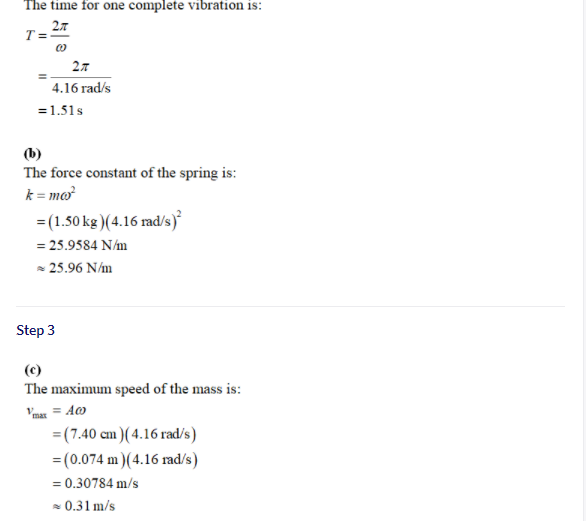1. A 1.50 kg mass on a spring has displacement as a function of time given by x(t) = (7.40 cm) cos[(4.16 rad/s)t – 2.42] Find (a) the time for one complete vibration; (b) the force constant of the spring; (c) the maximum speed of the mass; (d) the maximum force on the mass; (e) the position, speed, and acceleration of the mass at t = (f) the force on the mass at that time. 1.00 s;
1. A 1.50 kg mass on a spring has displacement as a function of time given by x(t) = (7.40 cm) cos[(4.16 rad/s)t – 2.42] Find (a) the time for one complete vibration; (b) the force constant of the spring; (c) the maximum speed of the mass; (d) the maximum force on the mass; (e) the position, speed, and acceleration of the mass at t = (f) the force on the mass at that time. 1.00 s;
Physics for Scientists and Engineers with Modern Physics
10th Edition
ISBN:9781337553292
Author:Raymond A. Serway, John W. Jewett
Publisher:Raymond A. Serway, John W. Jewett
Chapter15: Oscillatory Motion
Section: Chapter Questions
Problem 27P
Related questions
Question
View Image.
Kindly answer: d,e,f
![1. A 1.50 kg mass on a spring has displacement as a function of time given by
x(t) = (7.40 cm) cos [(4.16 rad/s)t – 2.42]
Find (a) the time for one complete vibration; (b) the force constant of the spring;
(c) the maximum speed of the mass; (d) the maximum force on the mass;
(e) the position, speed, and acceleration of the mass at t= 1.00 s;
(f) the force on the mass at that time.](/v2/_next/image?url=https%3A%2F%2Fcontent.bartleby.com%2Fqna-images%2Fquestion%2Fd28261d6-5a32-4850-b881-eb4a1bfe2fe6%2Fec557bf9-7ea9-4969-a389-922f686fbd72%2Flmtyihs_processed.jpeg&w=3840&q=75)
Transcribed Image Text:1. A 1.50 kg mass on a spring has displacement as a function of time given by
x(t) = (7.40 cm) cos [(4.16 rad/s)t – 2.42]
Find (a) the time for one complete vibration; (b) the force constant of the spring;
(c) the maximum speed of the mass; (d) the maximum force on the mass;
(e) the position, speed, and acceleration of the mass at t= 1.00 s;
(f) the force on the mass at that time.

Transcribed Image Text:The time for one complete vibration is:
2.7
T =-
27
4.16 rad/s
=1.51s
(b)
The force constant of the spring is:
k = mo
=(1.50 kg)(4.16 rad/s)
= 25.9584 N/m
- 25.96 N/m
Step 3
(c)
The maximum speed of the mass is:
= Ao
=(7.40 cm )(4.16 rad/s)
mar
=(0.074 m)(4.16 rad/s)
= 0.30784 m/s
- 0.31 m/s
Expert Solution
This question has been solved!
Explore an expertly crafted, step-by-step solution for a thorough understanding of key concepts.
This is a popular solution!
Trending now
This is a popular solution!
Step by step
Solved in 2 steps with 2 images

Recommended textbooks for you

Physics for Scientists and Engineers with Modern …
Physics
ISBN:
9781337553292
Author:
Raymond A. Serway, John W. Jewett
Publisher:
Cengage Learning

Principles of Physics: A Calculus-Based Text
Physics
ISBN:
9781133104261
Author:
Raymond A. Serway, John W. Jewett
Publisher:
Cengage Learning

Physics for Scientists and Engineers
Physics
ISBN:
9781337553278
Author:
Raymond A. Serway, John W. Jewett
Publisher:
Cengage Learning

Physics for Scientists and Engineers with Modern …
Physics
ISBN:
9781337553292
Author:
Raymond A. Serway, John W. Jewett
Publisher:
Cengage Learning

Principles of Physics: A Calculus-Based Text
Physics
ISBN:
9781133104261
Author:
Raymond A. Serway, John W. Jewett
Publisher:
Cengage Learning

Physics for Scientists and Engineers
Physics
ISBN:
9781337553278
Author:
Raymond A. Serway, John W. Jewett
Publisher:
Cengage Learning

College Physics
Physics
ISBN:
9781305952300
Author:
Raymond A. Serway, Chris Vuille
Publisher:
Cengage Learning

College Physics
Physics
ISBN:
9781285737027
Author:
Raymond A. Serway, Chris Vuille
Publisher:
Cengage Learning

Physics for Scientists and Engineers: Foundations…
Physics
ISBN:
9781133939146
Author:
Katz, Debora M.
Publisher:
Cengage Learning